

Big Data - "Dangerous (feat. Joywave)" [LYRIC VIDEO] (NSFW) We’re waging war on those we want to trust us — and yes, it’s weird. Xerox Tests Workforce Science from Evolv in Its Call Centers. Xerox is screening tens of thousands of applicants for low-wage jobs in its call centers using software from a startup company called Evolv that automatically compares job seekers against a computer profile of the ideal candidate.
According to these data, culled from studying job records of many similar workers, past experience working in call centers isn’t a good predictor of success. Instead, a person should be a “creative” type, though not too inquisitive. Participating in one social network like Facebook is a plus, but involvement in too many is a negative. Why an Internet of Everything event? "It's the world waking up" (Image via Shutterstock) What inefficiencies frustrate you in your day-to-day life?

What could work better about your home and the things that surround you—your car, your commute, your job, your health care, your aging parent’s physical situation, or your local government? Entrepreneurs and innovators are beginning determinedly to address those problems. Maverickwoman : How #bigdata creates prediction... Who Owns the Future? by Jaron Lanier; Big Data by Victor Mayer-Schönberger and Kenneth Cukier – review.
Jaron Lanier is a digital visionary with a difference.
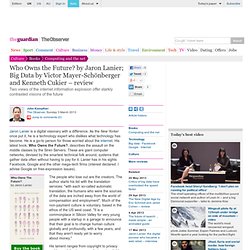
Who Owns the Future? by Jaron Lanier – review. Jaron Lanier, groundbreaking computer scientist and infectious optimist, is concerned that we are not making the most of ourselves.
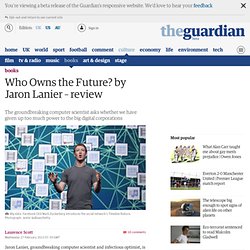
What Google Searches About the Future Tell Us About the Present. Google (GOOG) search data have become a statistical gold mine for academics, scientists, and number crunchers, who have used it for everything from predicting flu outbreaks to determining to what extent racial prejudice robbed Barack Obama of otherwise certain votes.
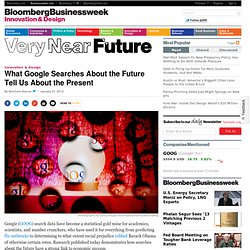
Research published today demonstrates how searches about the future have a strong link to economic success. Two academics in the U.K., Warwick Business School associate professor Tobias Preis and Dr. Helen Susannah Moat of University College London, analyzed more than 45 billion public Google searches performed during 2012 and calculated the ratio between searches that included “2013” and those that included “2011.” This makes sense. Can Big Data Change Who You Are? Big Data Is Great, but Don’t Forget Intuition. Andrew McAfee, principal research scientist at the M.I.T.
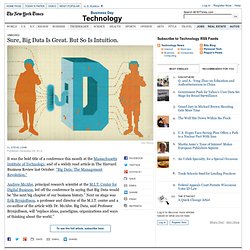
Center for Digital Business, led off the conference by saying that Big Data would be “the next big chapter of our business history.” Next on stage was Erik Brynjolfsson, a professor and director of the M.I.T. center and a co-author of the article with Dr. McAfee. Professor Nigel Shadbolt outlines plans for Open Data Institute. The government-funded Open Data Institute will focus on incubating and nurturing new businesses wanting to harness open data, training and promoting standards, according to co-director Professor Nigel Shadbolt, who is heading up the £10 million project with Tim Berners-Lee. First announced by George Osborne in his Autumn Statement, the Open Data Institute has been developed with help from the Technology Strategy Board.
It aims to become a centre of excellence to drive economic growth through the application of open data. Launched with government funding as a private company limited by guarantee (i.e. not focused on profit), the Institute will solicit match funding from private companies to ensure that it is sustainable. These companies will become "members" of different levels based on their support. How He Got It Right by Andrew Hacker.
The Future Of Big Data - 5 Dimensions - with Infographic Part 1. Big data is a critical concept for businesses and any modern company strategic intelligence.
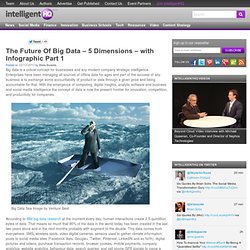
Enterprises have been managing all sources of offline data for ages and part of the success of any business is to exchange some accountability of product or data through a given price and being accountable for that. With the emergence of computing, digital insights, analytic software and business and social media intelligence the concept of data is now the present frontier for innovation, competition, and productivity for companies. Big Data Sea Image by Venture Beat. G.E. Looks to Industry for the Next Digital Disruption. Thinking In Network Terms. It has changed partly because we started to be aware of it partly because there were a lot of technological advances that forced us to think about connectedness.
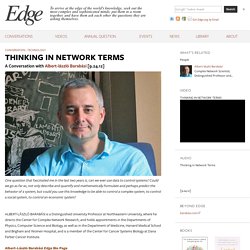
We had Worldwide Web, which was all about the links connecting information. We had the Internet, which was all about connecting devices. We had wireless technologies coming our way. Why are so many men pregnant? Garbage in, garbage out the old adage goes.
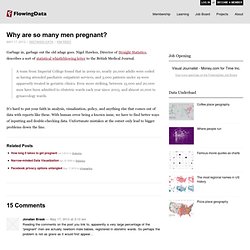
Nigel Hawkes, Director of Straight Statistics, describes a sort of statistical whistleblowing letter to the British Medical Journal. A team from Imperial College found that in 2009-10, nearly 20,000 adults were coded as having attended paediatric outpatient services, and 3,000 patients under 19 were apparently treated in geriatric clinics. Even more striking, between 15,000 and 20,000 men have been admitted to obstetric wards each year since 2003, and almost 10,000 to gynaecology wards.
It's hard to put your faith in analysis, visualization, policy, and anything else that comes out of data with reports like these. 5 Things I Learned About the Future from Stephen Wolfram. Lots of the knowledge dropped at South By Southwest Interactive is vertical.
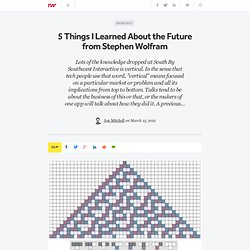
In the sense that tech people use that word, "vertical" means focused on a particular market or problem and all its implications from top to bottom. Talks tend to be about the business of this or that, or the makers of one app will talk about how they did it. A precious few talks are horizontal, though. They consider the challenges and opportunities in tech across all disciplines.
Announcing the School of Data. The following post is by Rufus Pollock, Director and Co-Founder of the Open Knowledge Foundation, and Philip Schmidt, Co-Founder and Executive Director of Peer 2 Peer University.
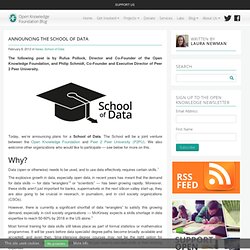
IBM's Watson is changing careers - Big Tech. FORTUNE -- Beating lowly humans on Jeopardy was just the beginning. IBM's famed Watson supercomputer will soon be available as a commercialized analytics tool for data-heavy industries like healthcare, telecom and financial services. It's been one year since Watson followed in the footsteps of its chess-playing predecessor Deep Blue and proved -- just in case anyone had a doubt -- that machines are smarter than people.
Now, Watson's first pilot customer, Indianapolis-based insurance company WellPoint (WLP), is getting ready to take the massive analytics engine for a test drive. More beta customers (spanning both healthcare and financial services) will follow in the next few months, according to IBM's (IBM) general manager of Watson Solutions, Manoj Saxena. MORE: Buffett goes big in Big Blue Watson was the result of IBM's years-long quest to build a natural language processing machine that could answer questions with speed and accuracy. Big data. Analyzing large data sets—so called big data—will become a key basis of competition, underpinning new waves of productivity growth, innovation, and consumer surplus as long as the right policies and enablers are in place. Research by MGI and McKinsey's Business Technology Office examines the state of digital data and documents the significant value that can potentially be unlocked. However, companies and policy makers must tackle significant hurdles to fully capture big data's potential - including a shortage of skilled analysts and managers.
The United States alone faces a shortage of 140,000 to 190,000 people with analytical expertise and 1.5 million managers and analysts with the skills to understand and make decisions based on the analysis of big data. In this interactive we explore where in the US economy analytical talent is employed. Launch the interactive. Big Data’s Impact in the World. Watson's New Job: IBM Salesman.
Big Data - Open Enrollment. Management and Leadership.